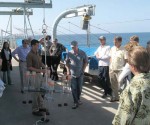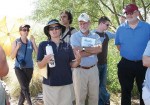The 11 LTER projects reviewed in 2007 comprise the largest cohort for a site review year. These sites reach almost to both poles and range from the open ocean to mountaintops, representing a scientifically and geographically diverse and logistically challenging combination. Consequently, NSF staff from across the Foundation facilitated particular reviews or came along as observers, in addition to the two LTER Program Directors in the Division of Environmental Biology (DEB) in the Directorate for Biological Sciences (BIO), Henry Gholz and Martyn Caldwell.
Phil Taylor and Dave Garrison, Program Directors in the Division of Ocean Sciences in the Geosciences Directorate at NSF, coordinated the coastal and marine reviews of the California Coastal Ecosystem (CCE), Moorea Coral Reef (MCR), and Plum Island Estuary (PIE) projects. The reviews of the two urban LTER sites, the Baltimore Ecosystem Study (BES) and Central Arizona-Phoenix (CAP), were facilitated by Tom Baerwald, Program Director in the Division of Behavioral and Cognitive Sciences (Directorate for Social, Behavioral and Economic Sciences) and included social scientists on the review team. Roberta Marinelli, Program Director in the Office of Polar Programs' Antarctic Division, is coordinating the final 2007 review of the McMurdo Dry Valleys (MCM) project, which will actually occur during the Southern Hemisphere summer in January 2008. Lou Pitelka and Dan Childers, both Program Officers in the Division of Environmental Biology, were observers of the CAP and CCE reviews, respectively, while Yong Jiang, a Sea Grant Fellow in Bio-Oceanography, came on three reviews. Also participating in the BES review were Jessica Corman, Angela Early, Elaine Franklin, and Elizabeth Gaige, Science Assistants in BIO.
Despite the diversity of LTER projects in this cohort, some common issues emerged from this year's reviews, generally reflecting the maturity of science across LTER. For example, synthesis of site data and knowledge to demonstrate progress across various subprojects at the sites, the use of modeling for integration, and development of a cross-site research focus, were common themes. As some of these sites have been members of the LTER network since the very beginning (e.g., NWT began in 1980), the challenges of maintaining critical long-term core datasets was hardly a surprising topic brought up during most all of the reviews.
The 2007 site review year marked a "first" in the LTER community: Bob Waide, the LTER Network Office Executive Director, appropriately enough became the first person ever to have visited all 26 LTER sites when he attended the MCR site review in July. Waide's unique accomplishment was quickly matched when Henry Gholz visited CCE in September; he now has the dubious honor of having been to all 26 sites for the purpose of conducting mid-term reviews.
These mid-term reviews are an essential part of NSF's ongoing evaluation cycle of the LTER program. NSF recruits a team for each review that consists of five independent, external scientists. The team visits the site, reviews the accomplishments and plans of the project, and writes a report to NSF containing an evaluation and recommendation. The report is then forwarded to the site's Principal Investigator (PI), with comments added by NSF in a cover letter. The site reviews also serve as opportunities for site scientists and staff to interact and discuss ideas with the review team. An LTER mid-term site review occurs during the third year of each project's six-year funding cycle. Accordingly, the 11 sites reviewed in 2007 will have their renewal proposals reviewed by a renewal panel in April 2010. Similarly, the six projects that had mid-term reviews in 2005 (CWT, KNZ, AND, NTL, PAL and SGS) will have their renewal proposals reviewed by a renewal panel in April 2008. The final cohort of nine LTER sites (CDR, FCE, GCE, HFR, JRN, LUQ, SBC, SEV and VCR) will have its next mid-term reviews in 2009, with subsequent renewal proposals considered by an April 2012 panel.
Personnel Changes in NSF/LTER
We note that Martyn Caldwell will be rotating out of NSF in July 2008. Martyn will remain in the DC area during his well-deserved retirement. Dan Childers, formerly PI of the Florida Coastal Everglades, has replaced Martyn working with Henry on LTER in DEB.

 Enlarge this image
Enlarge this image


